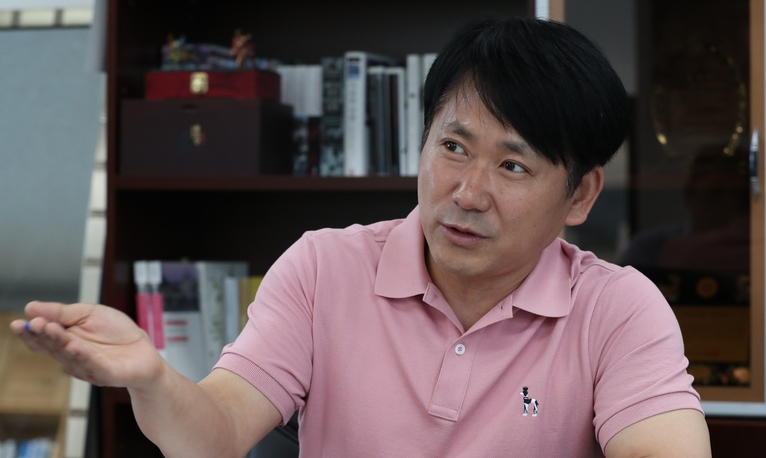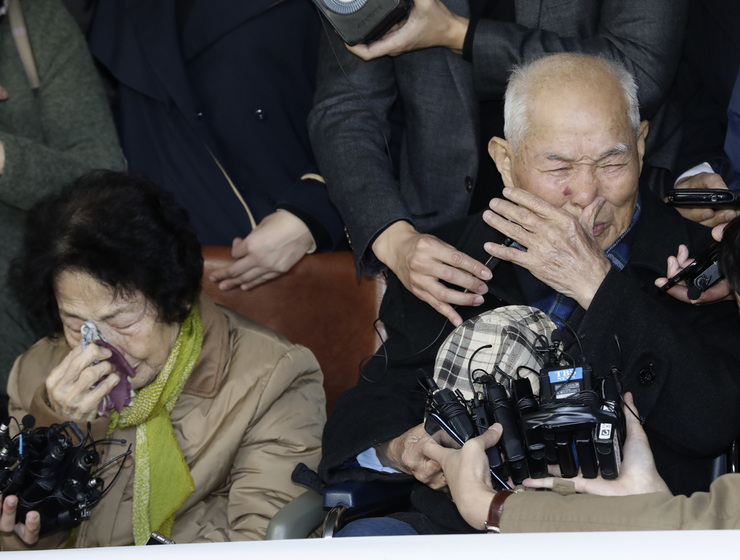 |
|
Lee Sang-gap, an attorney with the GongGam Human Rights Law Foundation, during an interview with the Hankyoreh in Gwangju on June 7. (Kim Jung-hyo, staff photographer)
|
Seoul has the responsibility of focusing on the victims while maintaining diplomatic relations with Tokyo
At the moment, the single greatest issue behind the dispute between South Korea and Japan is compensation for Koreans who were drafted for forced labor during the Japanese colonial occupation. Relations between the two countries deteriorated drastically after the Japanese government vociferously rejected last year’s decision by South Korea’s Supreme Court to hold Japanese companies responsible for compensating forced labor victims. The Japanese government continues to maintain that the forced labor issue was resolved through a 1965 bilateral agreement about outstanding claims and that the South Korean government should be the one to resolve this issue. Meanwhile, the South Korean government is maintaining a hands-off approach, insisting that the executive branch cannot intervene in the judicial process. Lee Sang-gap, an attorney with the GongGam Human Rights Law Foundation who has represented elderly female survivors of forced labor conscription at Mitsubishi Heavy Industries since 2009, said the situation has “turned into an incident that has escalated into a diplomatic battle between South Korea and Japan.” “The [South Korean] government needs to work with the forced labor survivors on finding a diplomatic solution that adheres to a ‘victim-centered’ approach,” insisted Lee, 52. Speaking about the solution, he said, “Even though the Supreme Court acknowledges the responsibility of Japanese businesses to pay compensation, we still would like to resolve the issue first through negotiations with Japan.” “But unless the Japanese government withdraws its approach of instructing the companies not to participate in talks, we have no choice but to use the available legal recourse in terms of procedures to convert seized assets into cash or additional recruitment of victims for legal action,” he added. The interview, which lasted for just over two hours, took place on June 7 at Lee’s office in Gwangju. Hankyoreh (Hani): Japan has been refusing to provide compensation for forced labor conscription. What are you planning to do going forward? Lee Sang-gap (Lee): Not long ago, victims of conscription at Nippon Steel and Fujikoshi began procedures to convert those companies’ assets into cash. We also plan to go through procedures shortly to convert seized Mitsubishi assets into cash. The victims are very old and cannot wait around forever. In addition to that, we’re preparing to recruit more victims to take legal action. Since the Supreme Court ruling in October of last year, we’ve received complaints involving 54 victims in nine cases in the Gwangju area, as well as 26 victims in 19 cases in Seoul. But this approach of pushing ahead with the legal case isn’t the one we originally wanted. We’d like to resolve matters through discussions with the Japanese companies. In the beginning, we had 17 rounds of negotiations with Mitsubishi between 2010 and 2012. Mitsubishi was coming out on top in all the lawsuits at the time. The fact that Mitsubishi agreed to our request for discussions anyway was a sign that they felt a kind of burden regarding the issue, and that they wanted to release that burden. But now they’re refusing any discussions – after the Japanese government instructed Japanese companies not to agree to any negotiations or reconciliation measures. Under the circumstances, we have no real alternative; we have to use every legal option that’s available to us. In the meantime, we can only wait and see if the situation changes. Economic retaliation would bring global focus on Japan’s historical wrongdoings Hani: Japan has said it will retaliate if the seized Mitsubishi assets are converted to cash. Some are predicting the situation could escalate into an economic conflict between South Korea and Japan, which would have major repercussions for every aspect of their relationship. Lee: We’re well aware of the public’s feelings and concerns about South Korea-Japan relations souring. If there is some kind of catastrophe, I don’t necessarily think the victims themselves will come under fire for their legal action, but there could be growing criticism of the government for failing to take responsibility and resolve things. We can already see how some of the media are going after the government for “failing to properly attend to relations with Japan.” I think [Japanese] Prime Minister Shinzo Abe is well aware of the South Korean government’s weak spots and does a good job of exploiting them. In Japan, there isn’t much public opinion holding the government accountable for the deterioration in relations the way there is in South Korea. If anything, the mood there supports Abe’s position that South Korea “violated a promise” with the 1965 Claims Settlement Agreement, with most people feeling that Abe is doing a good job for the sake of the national interest. This has allowed the Japanese government to turn the screws on Seoul without facing any kind of a backlash. In Japan, I think it’s a situation where a hardline position is beneficial in domestic political terms. That being said, I do think it’s too early to know whether the Japanese government is going to really back South Korea into a corner with something like economic retaliation. If the two sides do end up trading retaliatory measures, that’s going to draw interest from people around the world, and that in turn will draw attention to the fact that global Japanese businesses like Mitsubishi put [workers] into forced labor in the past and has yet to resolve any of the compensation issues. Nothing good will come of that for Japan. Another potential problem could be holes in the framework of trilateral security cooperation with the US to resist the rise of China and the North Korea threat. S. Korean government’s sense of burden from failed precedents Hani: The South Korean government has maintained that the administration can’t get involved because judicial procedures are currently under way. Lee: There have been two past instances where the government has taken action to resolve issues related to history. One was with Japan’s establishment of the Asian Women’s Fund in the mid-1990s, and the other was the comfort women agreement between South Korea and Japan in December 2015. Both of them were failed measures that only ended up drawing objections from the victims. I think the administration feels a sense of burden because of those failed precedents. There seems to be a concern that if they approach historical issues politically or as areas for diplomatic negotiation, they’ll just end up repeating the same failures. But the reason the past attempts ended in failure is not because the government tried to resolve things diplomatically per se; it’s because it was done unilaterally without hearing what the victims had to say. The government has nothing to fear from diplomatic negotiations. All they need to do is share the negotiation process with the victims. The key question is whether the principle of victim-centeredness is upheld in seeking a diplomatic solution. I don’t think many victims would turn their backs if [the government] shares the negotiation process, if they explain things in a forthright manner and ask for understanding, telling them things like, “This or that is going to be too difficult to achieve, but we might be able to do this much.” All of [the victims] know how tall an order negotiating with Japan is. Hani: Around the middle of last month, forced labor conscription survivors met with officials in the office of the Blue House Senior Secretary to the President for Civil Affairs. Do you see that as signaling a shift in terms of the administration’s willingness to get involved in the future? Lee: I think it may have been the first time that administration officials met with conscription victims because they wanted to hear their story. The fact that we have the G20 summit coming up in Osaka at the end of the month may have been a direct factor in getting the Blue House to take action. I suspect they met with us because there could end up being a South Korea-Japan summit and they wanted to review the agenda beforehand. It also looks like the continued pressure on the South Korean government from Japan over this issue had an influence. They seem to be thinking they need to come up with some kind of a response. Whatever the case, the administration was basically doing nothing not that long ago, whereas the situation now is one where the path to dialogue is not completely closed off.
 |
|
Lee Choon-sik, 94, the only remaining survivor among four plaintiffs that filed suit against the Japanese company responsible for their forced mobilization and labor during the colonial occupation, bursts into tears in front of the South Korean Supreme Court in Seoul on Oct. 30, 2018, after the court’s ruling that Nippon Steel & Sumitomo Metal Corporation should pay reparations to the victims. (Kim Myoung-jin, staff photographer)
|







